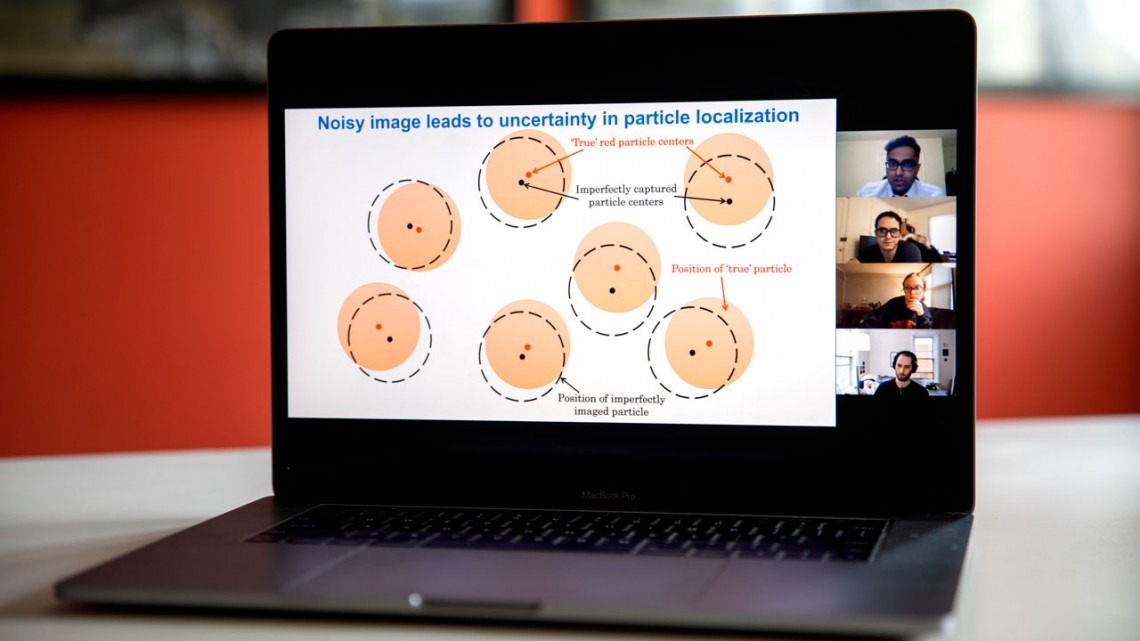
Amol Paranjape ’21, top, a mechanical engineering major, presents his research to graduate student judges on May 7 during the finals of the CURB Spring Symposium.
Undergrad research on display at CURB symposium
By Tom Fleischman
What could be more rewarding academically than helping to answer a previously unanswered question, or making a new discovery for the benefit of humankind?
For Stephie Lux ’21, not much.
“Undergraduate research has probably been the most impactful extracurricular for me in college,” said Lux, one of 15 finalists in the Cornell Undergraduate Research Board (CURB) Spring Symposium, held virtually May 4-7.
“When you find the right lab that matches your interests and personality, you can gain incredible mentors, as I have been fortunate to have, who will help you not only with research but with all areas of your life,” said Lux, who’s majoring in biomedical engineering in the College of Engineering. “You have the ability to partake in something that actually makes a difference in the world, which feels much more tangible than classwork alone.”
Lux’s presentation, “Optimization and Analysis of Bone Mimetic Microenvironments for Modeling Breast Cancer Metastasis,” was named best in the Applied Research category at the symposium, which included more than 30 undergraduate researchers presenting online to judges – a mix of graduate students and professors who donated their time – over three days.
The spring symposium was CURB’s 35th; last year’s event was canceled due to the pandemic.
Other award winners:
- Humanities – Charlotte Borgers ’21, a human development major in the College of Human Ecology (CHE): “Preschoolers Reasoning about Food: The Roles of Health, Desirability, and Permissibility.”
- Life Sciences – Garrett Ruff ’22, who’s majoring in human biology, health and society (CHE): “Chromatin Patterns Distinguish Breast Tumor Subtypes and Progression Stages in Association with ANP32E levels.”
In addition, awards were given for best science communication; best in scientific graphics; and social impact. The students all produced short synopses of their projects, which can be viewed here.
But winning is not the point of the symposium, or of CURB in general, participants said; it’s about the research.
“I’ve always thought of research as a way of having a distinct voice and a place within the academic community where you can dance on the edge of what’s known,” said symposium chair Anabella Maria Galang ’23, a biological sciences major in the College of Agriculture and Life Sciences.
“At the undergraduate level, research flings back the curtain of the lecture halls and compels students to question the underpinnings of what’s known,” Galang said. “You’re tinkering with the unknown in order to make the next generation’s coursework.”
Emi Carpenter ’23, a human development major (CHE) whose presentation on the role of passion projects in youth development was a Humanities category finalist, said participation in CURB has been revelatory.
“The breadth of extraordinary research that is done here at Cornell by our undergraduate students is truly inspiring,” said Carpenter, who transferred to Cornell this spring from the University of St. Andrews, in Scotland.
“I believe that undergraduate research brings students out of their comfort zone by presenting problems to which there is no definitive ‘right answer,’” said Amol Paranjape ’21, a mechanical engineering major, whose presentation on the impact of experimental noise on the diagnosis of hyperuniform systems earned Best in Scientific Graphics honors.
“In doing so,” he said, “[research] instills the courage to tackle a problem for which there may not be an expected result, which is most representative of real-life challenges.”
Bruce Monger, senior lecturer in the Department of Earth and Atmospheric Sciences (CALS, Engineering) and CURB’s faculty adviser since 2001, said scientists have a civic responsibility to be able to explain their work.
“In most cases, scientists were educated by universities built with the support, at least in part, of taxpayer money,” he said. “I tell students in my oceanography class that societies don’t build universities just so you can get a higher paying job, but rather they build them to create a highly educated group that can then feed their knowledge and wisdom back into society and make the whole of society better.”
Lux understands the importance of being able to clearly communicate science, and got plenty of chances to practice it while getting ready for her symposium presentation on breast cancer.
“Part of getting into (a Ph.D./M.D.) program involves knowing your work very well and being able to communicate it effectively,” she said. “My experience with CURB gave me an avenue to summarize my three years of work on my thesis project, and challenged me to present both to my family and friends as well as to graduate students in the field.
“The hands-on component of research is really enjoyable for me,” she added.
“I like going to lab even if I’m having a bad day because doing something in-person breaks up the day and helps relieve stress.”
In addition to the research presentations, the students heard a keynote address May 6 by Leonard Zon, stem cell biologist and professor of pediatric medicine at Harvard Medical School, who talked about his pioneering work with frogs and zebrafish, and offered advice to budding researchers.
Media Contact
Get Cornell news delivered right to your inbox.
Subscribe
